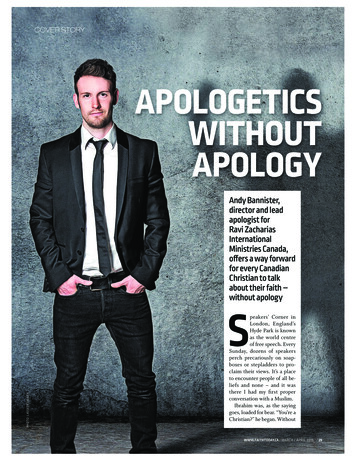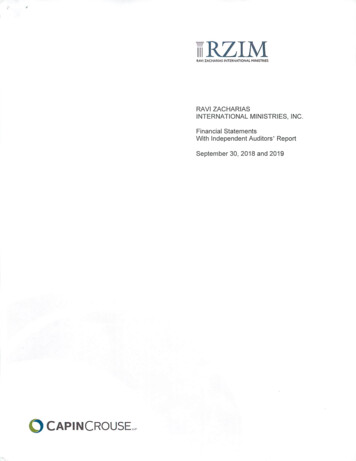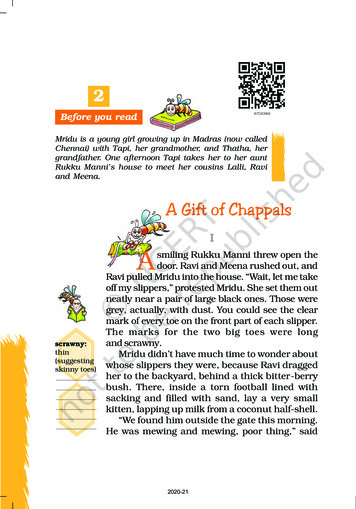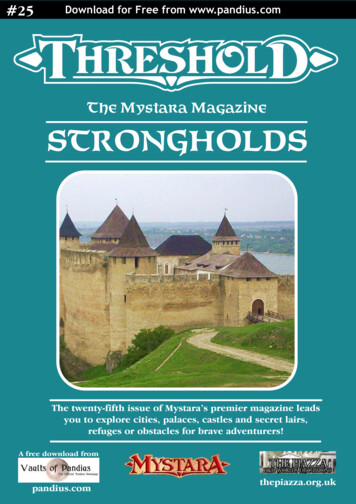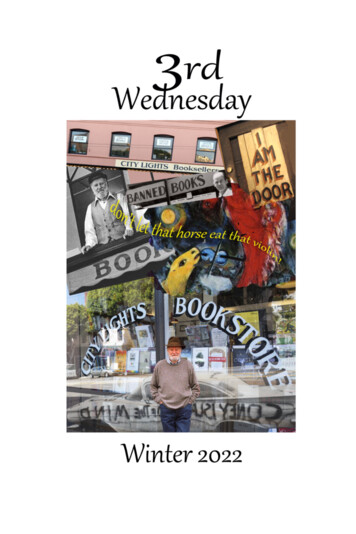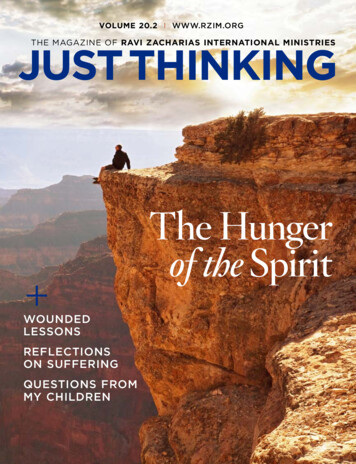
Transcription
VOLUME 20.2 I WWW.RZIM.ORGTHE MAGAZINE OF RAVI ZACHARIAS INTERNATIONAL MINISTRIESJUST THINKINGThe Hungerof the Spirit WOUNDEDLESSONSREFLECTIONSON SUFFERINGQUESTIONS FROMMY CHILDREN
TA B LEofCONTENT S20.2VOLUMEThe Hunger of the SpiritAnd the Ties That BindWhy do people turn to God? Is it becauseof pain? Is from being weary of pleasure?Join Ravi Zacharias as he looks at the realitythat both can leave haunting questions.Wounded LessonsThere are times when sin simply comes in andcompletely flattens us. But as Jill Carattiniobserves, in the midst of our brokenness, Jesusisn’t the one pointing this out. To the wounded,he simply says, “Come.”Reflections on SufferingMargie Zacharias has been pondering a lot onsuffering, its source and its purpose. What isthe meaning of suffering? Should God spare usfrom suffering when He didn’t his own Son?Questions from My ChildrenWhen questions you thought you had settledlong ago rise again to the surface, JohnNjoroge says it is easy to side with the skepticin questioning the very goodness of God.Think AgainRavi Zacharias explains that God alonecan weave a pattern from the disparatethreads of our lives—whether suffering,success, joy, or heartache—and fashion amagnificent design.
The Hunger of the SpiritAnd theTies that Bindby Ravi ZachariasWhy do people turn to God? Is it because of pain?Is from being weary of pleasure? The reality is that both leavehaunting questions. As Ravi Zacharias observes, the strugglebetween pain and pleasure gives spirituality a more definedgoal, and only God alone knows how we will respond.
JUST THINKING VOLUME 20.2The Hunger of the SpiritAnd the Ties that Bindby Ravi Zachariashave pondered long and hard the question of why people turnto God. I remember a woman from Romania telling me thatshe was raised in a staunchly atheistic environment. Theywere not allowed to even mention the name of God in theirhousehold, lest they be overheard and their entire educationdenied. After she came to the United States, I happened to beher patient when I was recovering from back surgery. When I had theprivilege of praying with her one day, she said as she wiped away hertears, “Deep in my heart I have always believed there was a God. I justdidn’t know how to find him.”This sentiment is repeated scores of times. More recently, I hadthe great privilege of meeting with two very key people in an avowedlyatheistic country. After I finished praying, one of them said, “I havenever prayed in my entire life, and I have never heard anyone else pray.This is a first for me. Thank you for teaching me how to pray.” It was agripping moment in our three-hour evening, and it was obvious thateven spiritual hungers that have been suppressed for an entire lifetimeare in evidence when in a situation where there is possible fulfillment.Although I agree that the problem of pain may be one ofthe greatest challenges to faith in God, I dare suggest that it is theproblem of pleasure that more often drives us to think of spiritualIExcerpted from Why Jesus? Rediscovering His Truth in an Age of Mass MarketedSpirituality (New York: FaithWords, 2012). Used by permission.
things. Sexuality, greed, fame, and momentary thrills are actually themost precarious attractions in the world. Pain forces us to accept ourfinitude. It can breed cynicism, weariness, and fatigue in just living.Pain sends us in search of a greater power. Introspection, superstition,ceremony, and vows can all come as a result of pain. But disappointment in pleasure is a completely different thing. While pain can oftenbe seen as a means to a greater end, pleasure is seen as an end in itself.And when pleasure has run its course, a sense of despondency cancreep into one’s soul that may often lead to self-destruction. Pain canoften be temporary; but disappointment in pleasure gives rise toemptiness. not just for a moment, but for life. There can seem to beno reason to life, no preconfigured purpose, if even pleasure brings nolasting fulfillment. The truth is that I have known people who in thepeak of their success have turned to God, and I have known others,drowning in pain and defeat, who seek God for an answer. Eitherextreme leaves haunting questions. God alone knows how we willrespond to either.This struggle between pain and pleasure, I believe, givesspirituality a more defined goal. People in pain may look for comfortand explanations. People disappointed in pleasure look for purpose.Dostoyevsky defines hell as “the inability to love.” I think that is apretty close description. But this is where, I believe, the West has lostits way and stumbled into the New Spirituality. We had what it took toexperience pleasure, but in the end, what we experienced took from uswhat we had in terms of value. Pleasure disappointed in the West,and in our boredom, we went searching for an escape in the strange orthe distorted, rather than looking to what God has clearly revealed inthe underpinnings of the Christian faith that point to the personof Jesus Christ. . . .T HE H UNGER OF THE S PIRITLife is a search for the spiritual. Whether in the throes of pain or in thedisappointments of pleasure, we strive for an essence that is beyond thephysical. Let me give you an example. Suppose you were to raise alittle child and give that child everything he needed . . . love, shelter,education, support, all the way to becoming an adult. Let’s call him Jason.One day, there is a knock on Jason’s door, and an older person standingoutside asks to meet him. After a few moments of conversation, thevisitor breaks the news to Jason that he is Jason’s biological father.
If this is the first time Jason has learned he is adopted, what doyou think will happen? How do you think he will cope with it? Hissensory emotions will tear him apart on the inside. “Why didn’t youtell me this?” would be his question to his adoptive parents. “Wherewere you when I needed you?” he would ask the biological father.Essence is far more than belief. Essence is belief based on the intrinsicbeing of the person. This is the hunger of the spirit beyond meresensory and belief components.This is why I believe that the intertwining of pain with pleasureis at the root of the human dilemma. These extremes of feeling ateither end of the spectrum that most of us wish to avoid, even as weare drawn into them, are the twin realities that help shape our search.We want to find happiness. We want to avoid pain. We want to knowwho we are. We want to know what we are. We care about our originand our essence. Pleasure and pain become indicators along the way onthe road that will lead us to our destiny, and they are rooted in thequestion of our origin.ife is a search for the spiritual. Whetherin the throes of pain or in the disappointments of pleasure, we strive for an essence thatis beyond the physical.LIt is not sufficient to say nice things such as “All religions say thesame thing.” Nobody, and I do mean nobody, really believes that.If they say they do, you can call their bluff in moments by exposing thepreconceived sovereignty they have exercised in evaluating onereligion over the other and by which they have arrived at theconclusion that all religions lead to the same destination, even thoughthe religions all say different things. How can anyone make such anassertion? Even in broad categories they do not say the same thing.Buddha himself rejected Hinduism because of some of its dogmas.And literally just days after his death, Buddhism began to fragmentinto a series of different Buddhist beliefs. Some even went into hiding,lest they be killed for the challenges they were making to the leadership. And only a short while after Muhammad died, blood was spilled
over who his successor would be. The first three of the five caliphs inIslam were assassinated—varnishing such facts with niceties doesn’tdo anyone a favor.Were these divisions for religious reasons? Oh yes, that is what isclaimed. It was for reasons of essence, but the apologists of these faithsfail to come to terms with the essential nature of their beliefs themselves. Belief systems must justify themselves. If they cannot, the evermore bizarre will be required to bring the same degree of fulfillment.We will pick this up again. For now, let me posit three things—relationship, stewardship, and worship—that must define life if thespiritual search as it relates to pleasure and pain is to be understood.Such definitions, then, build into a worldview.T HE T IES T HAT B IND : R ELATIONSHIPIn the Judeo-Christian worldview, all pleasure is ultimately seen fromthe perspective of what is of eternal value and definition. I often thinkof that day the astronauts became the first ones toGenesis 1:1In the beginning God go around the dark side of the moon. To them wascreated the heavensgiven a beautiful glimpse of the “earthrise” over theand the earth.horizon of the moon, draped in a beauteousmixture of blue and white and garlanded by the light of the sun againstthe black void of space. It was something human eyes had neverwitnessed before. Isn’t it fascinating that no poem or lyric came to thecommander’s aid in lending him words to express that moment of awe?Instead, the words that came to his mind were the first words of thebook of Genesis: “In the beginning, God.”There are moments like that in our experience when nothing cantake away from the miracle of human life. No amount of time canexplain it. No pondering within can satisfy all that the moment declares.There is something extraordinary here. It is not just the miracle of life;it is the miracle of life imbued with particular worth. The identity of thechild is as significant as the fact that it is. We all know that. The NewSpirituality distributes life into the generality of “consciousness” andloses the particularity of personal relationship. So it is not merely timewe are talking about here, or some pool of consciousness into which weall merge and from which we emerge. In the Judeo-Christian worldview,we believe that every “person” is actually created in God’s image, in thatGod himself is a person, and that each person has relational prioritiesthat are implicitly built in, not by nature but by God’s design.
Consider the tragedy of the earthquake and tsunami in Japan.Even in that stoic culture, where community rises above everythingelse, each one who wept was grieving the loss of their own loved ones:They were not grieving just for the total loss of life but also for theirpersonal loss. This is real. It is not imaginary. We stand before theindividual graves of the ones we love more often than we stand beforea graveyard in general.But there is more. Personhood transcends mere DNA. There isessential worth to each person.ecently in a game show, a computer (named Watson after the founderRof IBM) handily defeated two human contestants in a knowledgecontest. This had happened before when the computer Deep Bluebeat the world champion in chess, Garry Kasparov. Computers arefaster and better at calculations and at chess. But what one article saidis interesting: In this instance, where language was involved, Watson’svictory over its two human competitors advanced IBM’s master planof making humanity obsolete. I would add that the ultimate revengewould be for Watson to deny that humans exist or that they created“him.” You see, to create a computer to do what Watson did requiredbrilliance. As David Ferrucci, the principal investigator of Watson’sDeepQA technology at IBM Research, said,n the Judeo-Christian worldview, webelieve that every “person” is actually createdin God’s image, in that God himself is a person,and that each person has relational prioritiesthat are implicitly built in, not by nature butby God’s design.IWhen we deal with language, things are very different. Language isambiguous, it’s contextual, it’s implicit. Words are grounded really only in humancognition —and there’s seemingly an infinite number of ways the same meaningcan be expressed in language. It’s an incredibly difficult problem for computers.1
It was precisely the coding of that “human-ness” into Watsonthat required the effort of twenty-five of IBM’s top research scientists, and they accomplished it with a mishmash of algorithms and rawcomputing technology. “Watson is powered by 10 racks of IBM Power750 servers with 2,880 processor cores and 15 terabytes of RAM; it’scapable of operating at a galloping 80 teraflops. With that sort of computing power, Watson is able to. . . scour its roughly 200 million pagesof stored content—about 1 million books worth—and find an answer withconfidence in as little as 3 seconds.”2The question is, “What is Watson doing or thinking now?” Theentire question is reduced to one issue: What does consciousnessmean? It is not surprising that “consciousness” and “conscience” comefrom the same root word. When you put together terms like“consciousness,” “conscience,” “individual,” “right,” “wrong,” “good,” and“evil,” you are on the path to spiritual thinking. Matter alone or resortingto quantum doesn’t create spiritual thought. Deepak Chopra can write ofan ageless body and a timeless mind all he wants, but when you lose yourchild, something has been lost that can never be replaced—even if youhave another child—and can never be explained by his philosophy. Never.What this means is that our essence is both shared and particular—a truth that is Judeo-Christian in its assumption. This leads me tosee the critical and defining notion of essence and its connection torelationship. That must be defined first before pleasure can be derivedlegitimately or otherwise in concert with the essence of the thingenjoyed. So it is not merely the essence of the object that is beingenjoyed that matters. It is the essence of the subject who is experiencingpleasure that legitimizes or delegitimizes the experience.There is a clear and unequivocal assertion in the Judeo-Christianfaith that God created us for his purpose: to fulfill life’s sacred naturewithin the particularity of an individual life, in relationship with himand his indwelling presence. This particularity does not offset the factof being part of the larger community of fellow human beings. It doesnot deify us, nor does it demean us. To be a human being is to be onewho is fashioned in the image of God, who is the point of reference inall relationships. This is the difference between Islam and Christianity.In Islam, a person will kill to supposedly protect the honor of Allah. Inthe Christian faith, Jesus sacrificed his own life to honor the love ofGod as it is revealed for all humanity. In pantheism, the “I” dies thedeath of a thousand qualifications; hence that vacuous term “duty” in
the Gita or even “dharma.” For the Christian, the I is a person valuedby God. This is a world of difference from all other religions.In search of this relationship we pursue spiritual realities. Andoften we end up creating God in our own image when we have failedto see, or perhaps don’t like, what it is that God intended to convey tous in his love. No, this is not the “relativity” of physics, special orgeneral, or of quantum theory, or even of metaphysics. It is therelationship of a person within himself or herself. It is who we are, notfragmented, in the accretion of everything that makes us an individual.It is why we even refer to ourselves as “individuals” . . . indivisible . . .the underlying meaning being that we cannot be divided into parts.he good and decent among us mournbroken homes. We delight in longrelationships that have withstood the test oftime. This is a clue, a huge clue of how life isintended to be lived. We are designed, shaped,and conditioned to be in relationships of honor,and in our hearts we wish to see those relationships triumph over all other allurements.TEven in pantheism, one cannot be content with the Gnosticcategory of “knowledge.” Nor in Zen can we merely mutter “Rupa isnothing.” That is where the monists and Vedantists and Zen thinkerswish to leave us. Thus Hinduism has the Gita, the most beloved ofHindu texts (not the Vedas), in which questions of war, devotion, worship, and sacrifice are raised. These are relational issues. How can I goto war and kill my brothers? was the question Arjuna placed beforeKrishna. Only he didn’t know who Krishna was, so reality and thenature of the source of the answers were veiled from him in the earlystages of the text. What is good and what is evil? What is the rightthing to do? That’s what Arjuna wants to know. It came down to dutyin a play called Life.
Buddhism raises the issues of poverty, pain, sickness, death, responsibility, and the causes of misery. All these were not just ideas, theywere evidenced in persons or in how they impacted persons. Of all religions, Islam is the least focused on relationships, even though it givesthe appearance of being a community. And the result is law, authority,and power over the community. These become the rationale for Islam.Thus, it is not surprising that the very word Islam means “to submit.”And it’s no wonder that it is sometimes called a “pantheism of force,”where individuality is sacrificed at the altar of authority. SomeMuslims I have spoken to admit this is what Islam is, but insist that itwas not intended to be this way. How do you even debate such an issuewhen you are silenced if you disagree? This authoritarianism and submission become the means to the end of community. Any communitythere is exists only in the narrow confines of faith, which oftenprovides the adherents with justification to sacrifice their own for“their faith.” The faith, in effect, negates the person.I have two very special friends whose lives have been a blessing tocountless children who have been deformed from birth. They haveestablished an orphanage to give them a home and find medical help tocorrect what can be corrected. Then they look for families who willadopt them. One little boy had always been passed over for adoptionbecause he has a particular brain malfunction that is very rare. Heoften doesn’t connect thoughts. At about nine years of age, as Iremember the story, he was becoming despondent as, one-by-one, hesaw his housemates being selected by families and leaving. He began toask those who were taking care of him why no one was adopting him.Why didn’t anybody choose him?Through an incredible series of events, a couple from Texas, whohad already adopted one child from the same orphanage, called to askif this boy was still there. Through the goodness of the parents’ hearts,and the generosity of the couple who established the orphanage inagreeing to cover all the costs of his adoption, the day has been set forthis little boy to be taken to his new home. The special part of the thrillfor him is that he will be reunited with one of the little boys who washis housemate at one time.His actual name is quite hard to pronounce, but it is quite anormal name in his native setting. His adoptive parents have sent himthe name they want to give him—Anson Josiah, the initials of which areA.J. He now walks around that home, waiting for his new parents to
come for him, telling everybody as he points to his chest, “You can callme A.J. My name is A.J.” Is it not interesting that even with the debilitation of disconnected thoughts, he is able to pick up the redeemingthrill of relationship and particular worth evidenced in his new name?One of the great epic poems of the Middle East is Shahnama (orShanameh), written by the Persian poet and author Abu ol-QasemMansur Firdawsi (ca. 935–1020). In it he recounts the legendary history of the ancient kings and heroes of Persia. It is known to Englishreaders principally through Matthew Arnold’s version, written in themid-nineteenth century: Sohrab and Rustum. I remember reading it as ayoung lad in Delhi. Rustum is a mighty warrior, second to none. War ishis way of life and as the story unfolds, even though he has a family totake care of, Rustum is constantly far from home, taking on challenges.One day, he comes across a younger though equally well known warriornamed Sohrab. Sohrab is reluctant to take him on because he knowsthat Rustum is actually his father. Years before when he was a smallchild, Sohrab had been sent away by his mother to spare him thelifestyle of his father, and Rustum has been misled into believing thatthe child who was sent away was a daughter, born while he was gone.Sohrab and Rustum eventually meet in one-on-one combat.Twice, Sohrab could have fatally wounded Rustum, but he spares him.Finally, Rustum has Sohrab on his back, and victoriously plunges his swordinto Sohrab’s side. As the life is ebbing out of him, Sohrab tells Rustumwho he is and, when challenged, proves it by producing a locket his mother had given him. The rest of the story is the grief and remorse that fillRustum when he realizes he has killed his own son, who had spared himwhen he had the advantage.I find utterly fascinating the stories of deep relationship that arewoven into the histories of various cultures, stories that reveal thefolly of succumbing to the lure of power and prestige. What a tragedyto destroy our own children by denying the One who gave us life. Isn’tthat where we are today, in our geopolitical and religious wars?The good and decent among us mourn broken homes. We mournbroken lives. We mourn shattered dreams. We celebrate reunions. Wedelight in long relationships that have withstood the test of time. Thisis a clue, a huge clue of how life is intended to be lived. We aredesigned, shaped, and conditioned to be in relationships of honor, andin our hearts we wish to see those relationships triumph over all otherallurements. It has been nearly four decades since I lost my mother. I
don’t think a day goes by that I don’t think of her. Is all this not anindication, given to us by the One who made us, that we are designedto live within relationship and to find our greatest sense of worth andfulfillment within relationship?Relationships are multidirectional and multidimensional. Forthis, physics, chemistry, even psychology, for that matter, are all inadequate starting points. Relationship must begin with essence, not withthe essence of others but rather with the essence of oneself. That iswhy pleasure and pain become critical. It is not psychologically necessary to teach somebody that their parents matter. We know that byintuition. My life has been replete with examples of meeting peoplewho wish they could find that one friend or one relationship. It is notaccidental that in the long bibliography at the end of her book onspirituality, which draws sparsely from Christian literature, ElizabethLesser still finds place to mention C. S. Lewis’s A Grief Observed, apowerful book on the depth of his grief when he lost his wife, Joy.How and why is this so? In Christ-ianity, the essence of each andevery person and the individual reality of each life is sacred. It is sacredbecause intrinsic value has been given to us by our Creator. Atheism isthe extreme form of placing ultimate worth in an accidental universe.For the atheist, the only real relationship is between each person andthe universe. That is it. There is no outside voice or revelation. Toattempt to mask the loneliness of this reality, we offer parallel universes,aliens or some other entities somewhere that will surely someday findus if we don’t find them first. There was a play written some years ago
called Waiting for Godot. The title was a play on words for the lonelyinhabitants of the world in the play, waiting for a God who never showsup. The play to honor the sciences should be titled Waiting for Logo,which would mean waiting for a word from anybody out there.In pantheism, which is the basis of much of the New Spirituality,the “I” is lost in the desired union with the ultimate impersonalAbsolute; there is no more “I and you.” In rebirth, all actual relationship with what has preceded is lost, and we are encouraged to believethere is an essential relationship only with the deeds of the past. No one inthis cyclical framework ever answers what an individual was paying for inthe first birth. After all, one cannot have an infinite number of lives to theircredit: If there were an infinite number of births, one would never havereached this particular birth. So, going backward, what was the debt owed inthe first life? As one of my Hindu friends once said after he came to knowJesus, “Even the banks are kinder to me. At least the bank tells me how muchI owe and how much time I have to repay what I owe. In karma, I don’tknow what I owe or how long it will take me to repay it.” For DeepakChopra to bring relief to Maharishi Mahesh Yogi by telling him that his(Chopra’s) blood would not carry his karma to the Maharishi borders onthe pathetic . . . the pupil having to reassure the teacher that karma wasnot carried in the blood. Where is it carried, one might ask, in an ageless body and a timeless mind?A relationship with God that is both individual and to be reflectedto the rest of humanity in a shared birthright is God’s gift to us.S TEWARDSHIPIt is in the area of stewardship that I think Christians have done an enormous amount but have also failed in a very serious way. The priority wasright, but the reach was short. Let me explain.The world is in great need. There is so much that needs to bedone. Ask yourself this question: Which worldview has reached out themost globally? The numbers are staggeringly disproportionate. I rememberin the early days of my travels walking into institutions for people withleprosy. You can go to the fringe of the Sahara desert or to the island ofMolokai in Hawaii and see the footprints of Christian missionaries atwork there. Look at the hospitals in many parts of the world, theorphanages, the rescue homes, the care for widows. Look way beyondthe reach of one’s own land. It is not enough to say that America hashad much and therefore Americans ought to give. What about the
wealth in the oil-rich nations of the world . . . how many hospitals anduniversities, orphanages and rescue homes have been built by thatmoney? There is so much need in India that one just grows accustomed to it and walks by. Does Allah desire that billions of dollars bespent on a mosque while millions of people live in terrible need?Bangladesh, a Muslim country, is one of the poorest areas in the world,where hundreds of thousands live below the poverty line. In contrastgo to Abu Dhabi, also a Muslim country, where the sheikh has spentmore than 3 billion to build a mosque. Is this stewardship? Is this forGod’s glory, or is it for the glory of an earthly kingdom that forgetsothers of the same faith who are living on the edge?But present-day Christians cannot rest on the actions ofChristians of previous generations. Today, we would do well to also askourselves this same question as we build our church megaplexes thatoften border more on memorials to human icons than on anythingthat lifts the heart toward God.Whatever one may say, only the blind and the antisocial can ignorethe realities of a desperately needy world. Christopher Hitchens’s cheapbook attacking Mother Teresa showed a heart that was so hard he couldnot be touched even by the reach of a little woman with a big heart.But I have to say that there is one area in which we as Christianshave been negligent. We may have a good track record for reaching outto the hurting of the world . . . to building relationships with the world,but by and large we forget that there is a natural world out there to beprotected as well. We have been negligent in matters of the environment, and just because the environment has no feelings we trample itunderfoot. The pantheist deifies the impersonal and we ignore it. Bothextremes are wrong. The created order was meant to be cared for.If essence gave me the reason for relationships, existence gave methe mandate for stewardship. The world exists in real terms. It is notmerely form. It is also substance.WORSHIPIn my study at home, I have an old Anglican prayer bench. It is myplace of refuge. It is where I come on my knees before God and openmy heart in its most deeply felt struggles and needs. If you had told meas a young lad going to church that someday I would long for a prayerbench, I would have despaired even more than I already did. Kneeling in
worship and being aware of others kneeling beside me was not exactlythe highlight of my week. I would covertly glance out the corner of myeye to see what others were doing. Worship was nothing more than a wordin my vocabulary. I saw prayer and the repetition of creeds as nothingmore than a hypnotic effort at inducing some state of mind. It matteredlittle, except at examination time and in times of crisis. It was a sort of“God, if you are there, please help.” Now, in my adult years, I have seenmore happen during my time of prayer than any other time.orship of the Supreme Being is whatmakes it possible to find unity in diversity in the world around me by enabling me tofind unity and diversity within myself, first.Worship is the starting point.WThe hunger for worship is one of the greatest clues in life. In India,temples are full, and the whole cultic experience of priests, ceremonies,chants, blessings, fears, and superstitions is all part and parcel of theculture. You grow up knowing and accepting that “religion” is a vital partof a person’s life. The interesting thing is that we seldom ask the questions that ought to be asked. Why? It seems that whatever ceremonieswe are taught become part of our personal culture, a habit of the heartand an expression of our community. More often than not religiousrites are performed out of fear or superstition. And they are seldomquestioned or examined.Growing up, I noticed many culturally meaningful things thatseveral of my friends did. One was to touch the feet of the father of thefamily to show respect. This was a very admirable and beautiful act
by Ravi Zacharias Why do people turn to God? Is it because of pain? Is from being weary of pleasure? The reality is that both leave haunting questions. As Ravi Zacharias observes, the struggle between pain and pleasure gives spirituality a more de

